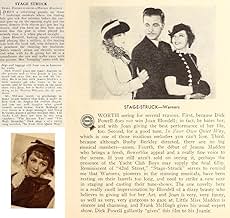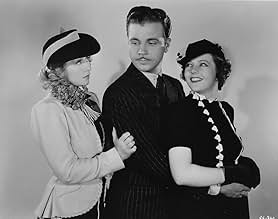Aggiungi una trama nella tua linguaBroadway dance director George Randall (Dick Powell) is stuck with staging a Broadway show starring Peggy Revere (Joan Blondell), a wealthy but untalented performer who is starring only beca... Leggi tuttoBroadway dance director George Randall (Dick Powell) is stuck with staging a Broadway show starring Peggy Revere (Joan Blondell), a wealthy but untalented performer who is starring only because she is backing the show. Tempers flare during rehearsals, but suave producer Fred Harr... Leggi tuttoBroadway dance director George Randall (Dick Powell) is stuck with staging a Broadway show starring Peggy Revere (Joan Blondell), a wealthy but untalented performer who is starring only because she is backing the show. Tempers flare during rehearsals, but suave producer Fred Harris (Warren William) smooths things over by pretending to each combatant that each one secr... Leggi tutto
- Regia
- Sceneggiatura
- Star
- Premi
- 1 vittoria in totale
- Oscar Freud
- (as Johnnie Arthur)
- Dr. Stanley
- (as Thomas Rogue)
- Heney
- (as Ed. Chandler)
Recensioni in evidenza
If you loved GOLD DIGGERS OF 1933 you will like this. Not only has it got most of the original cast but it's got a similar story as well. It's even got a Ruby Keeler substitute who's acting is even worse than the real Ruby Keeler's! STAGE STRUCK was clearly made for fans of GOLD DIGGERS OF 1933, it's got that similar cheery uplifting feel that the original had, it's got the same actors such as Frank McHugh essentially repeating their best lines from the previous four films, it's even got the same shabby looking sets. It doesn't sound like it should work but it does.
The positives outweigh the negatives but there are lots of negatives. The main negative is that it looks incredibly cheap, some scenes look like they were filmed in a the back of someone's garage - someone who couldn't afford to have more than one electric light on at a time. Another surprising negative is how flat and unimaginative Busby Berkley's direction is (strange how once he got the director's chair, his sense of innovation seemed to desert him - but I think he only had a $2.00 budget to work with). And possibly the worst thing about this is that it features various ten minute slots of acts who were enjoying their five minutes of fame in 1935. One of these 'turns' a group called The Yacht Club Boys sing a song bemoaning having to pay tax to the government. Doesn't seem very public spirited especially since everyone back then was meant to be pulling together along with FDR! I can't imagine something like this being used back in the good old days when uncle Darryl Zanuck ran Warners.
One final point - Joan Blondell is great in this. We're used to seeing her playing the usual sassy Joan Blondell character so it's refreshing to see her doing something a little different; this time a straight comedy role. It's a shame she never got the chance to do more comedy characters because she could be very funny. Admittedly her part is necessarily completely one dimensional but she's brilliant at it.
But what about everyone's favorite sassy dame, Blondell, whose role unfortunately sort of comes and goes. Looks to me like her part was an add-on to inject some badly needed pizazz into the feminine side. That's because poor Jeanne Madden looks lost in the aspiring ingénue role. At times, she seems almost achingly self-conscious of the camera, which I think carries over to the audience. Since her career ended soon after, I hope she found a more fitting line of work. Then there's the Yacht Club Boys, surely one of the worst novelty acts of any period to rant and somersault on the same screen.
Anyway, the plot couldn't be more familiar—the problems of putting on a big-time musical. Weirdly, we never get to see the actual show, which ordinarily would be the boffo climax. Considering the many eye-catching musicals from Warner Bros., this one looks like the least of the litter. Too bad.
It's a slightly off-key Warner Brothers musical that wants to be a screwball comedy, with director Powell fending off wacky relatives and the advances of untalented diva Blondell, while producer William employs Freudian psychology to unite the mismatched pair, while Powell pursues an on-again-off-again-on-again romance with maddeningly fresh-faced ingenue Madden. (Her flat line readings make Ruby Keeler sound like Bette Davis.) Oh, the Yacht Club Boys are in it, too, with two endless specialty numbers that may have had resonance in 1936 -- one's about income taxes, the other about physical culture -- but their forced goofiness has dated badly.
Most surprisingly, despite the Berkeley imprimatur, there are no production numbers here; Warners, one has to assume, was on a budget binge. So the saving graces are the nice Arlen/Harburg songs, and Blondell, in an uncharacteristically broad and unsympathetic role. You don't believe her for a moment, yet she's terrific, batting her eyes and flashing her teeth and cavorting like an over-the-top Carole Lombard. This lady could do anything, but she doesn't really save this all-too-middling musical.
Revere then gives $50,000 to producer Fred Harris (Warren William) who has gotten Randall to sign an iron-clad contract. Now, can he keep these two from killing one another during rehearsals? Harris decides to rely on psychology and tells Revere that her hatred of Randall indicates deep love. Randall, meanwhile, has met an ingenue (Jeanne Madden) and, rather taken with her, is trying to discourage her from getting a job in the show.
Blondell is in fact doing a takeoff on the outrageous Peggy Hopkins Joyce, an heiress known for her six marriages, love affairs, million dollar shopping sprees and for being the owner of the Portugese diamond, which she sold to Harry Winston. She actually worked in the Ziegfeld Follies and Earl Carroll's Vanities. William's character is based on ruthless producer Jed Harris, the man so hated by Laurence Olivier that he modeled his Richard III after him.
The numbers by Arlen and Harburg aren't their greatest, but a standout is a quartet about taxes done by The Yacht Club Boys. Powell and Madden sing a lovely "Fancy Meeting You," and Frank McHugh replaces the female lead in the funny Lady of the Moon number.
Good fun - Dick Powell and Joan Blondell got married before the release of this film, which helped it at the box office. They stayed married for eight years, until she complained about all the guests they constantly had, at which point, he said, 'If you don't like it, you can get the hell out.' I guess I prefer to think of them as newlyweds.
It's very hard, however, to believe that this one ever got any raves--and, indeed, Jeanne Madden in real life made two more pictures, then dropped from sight. With her pinched voice, crinkly-faced wholesome looks, and complete lack of sex appeal, she's another Janet Gaynor--of whom one was more than enough. Joan Blondell, usually a reason to cheer up, mugs and clowns to a degree that would be over the top in a revue sketch--she's supposed to be a Park Avenue socialite but makes the role into that of a common, vulgar girl pretending to be one.
Dick Powell, tricked out with an imitation Don Ameche look, seems to be pretending to be somewhere else.
Lo sapevi?
- QuizWarner Bros. suspended Pat O'Brien when he rejected a role in this film.
- Colonne sonoreFancy Meeting You
(1936) (uncredited)
Music by Harold Arlen
Lyrics by E.Y. Harburg
Sung by Dick Powell and Jeanne Madden
I più visti
Dettagli
- Data di uscita
- Paese di origine
- Lingua
- Celebre anche come
- En scène
- Luoghi delle riprese
- Azienda produttrice
- Vedi altri crediti dell’azienda su IMDbPro
- Tempo di esecuzione1 ora 31 minuti
- Colore
- Mix di suoni
- Proporzioni
- 1.37 : 1



































